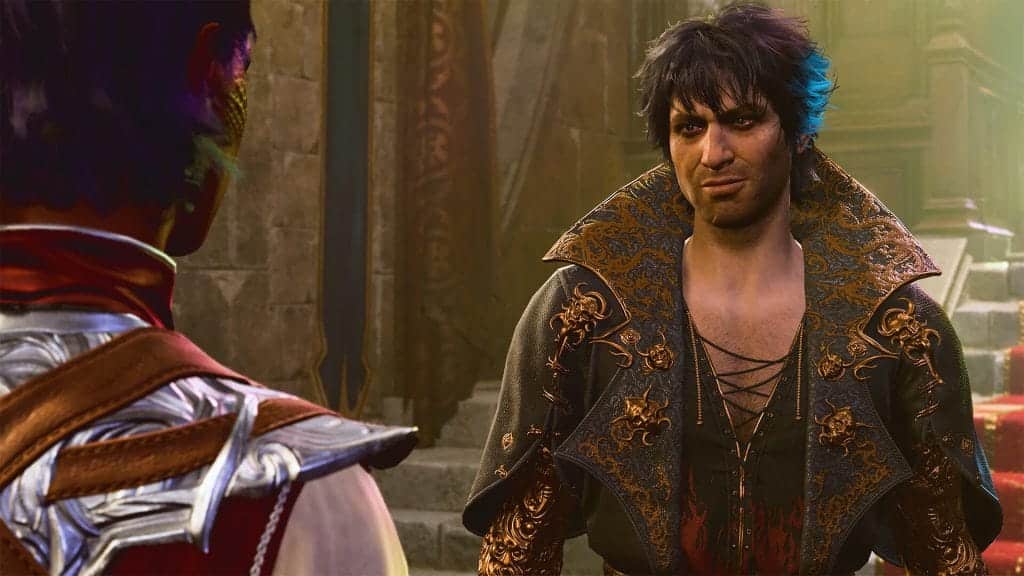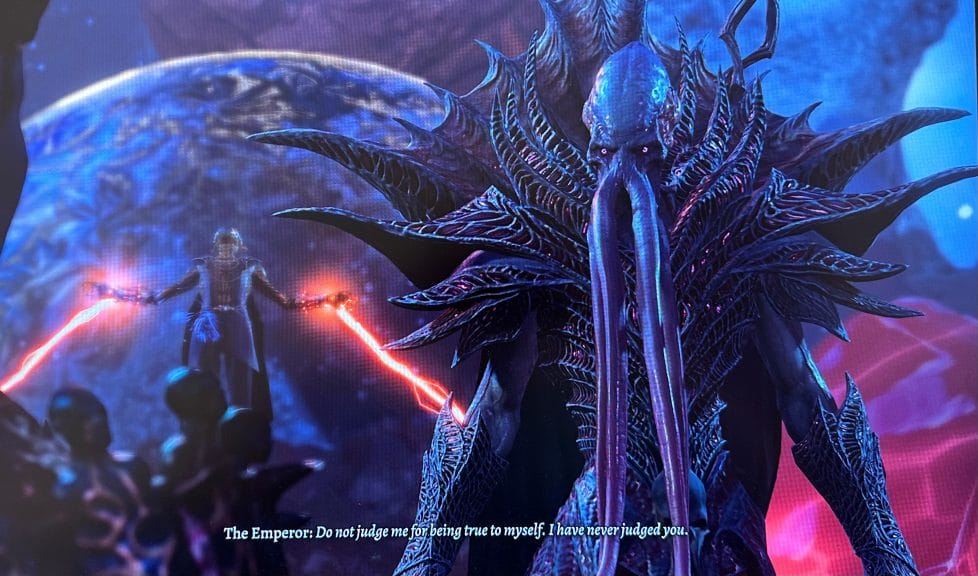Larian Studios received critical acclaim for their hit release, Baldur’s Gate 3, cleaning up at the Game Awards. They won the awards for Game of the Year, Best Roleplaying Game, Player’s Choice, and several others in recognition of their masterful storytelling and the tremendous impact Baldur’s Gate 3 had on its players. Warning: Spoilers ahead for the plot of Baldur’s Gate 3.
The characters of Baldur’s Gate 3, both the playable companions and the non-player characters that populate the rich fantasy world, stand out as an undeniable strong point of the game’s writing. Many of the game’s important figures have rich, nuanced characterization and plotlines that shift depending on player choices. From an extraterrestrial warrior exiled by her people to a vampire spawn struggling to gain control of his life, there’s no shortage of compelling personalities your player character can interact with.
Amidst all the fun fantasy hijinks and likable folks to team up with in the game, however, Larian manages to write several characters that embody realistic and varied forms of manipulative personalities. These characters range from openly emotionally abusive and controlling to more subtle actors who may go under the player’s radar. It’s rare to see a game go into such depth when depicting manipulators, especially in such a way that divides their audience on whether or not a certain character is even manipulative.
But the conflict between manipulation and free will acts as a key theme in the game’s story, with your character and their allies trying to escape the mind control of a monster called an Elder Brain, so Larian needed to get this right.
Let’s look at a few of the game’s key players and examine the manipulative side of each of their personalities. The differences in how they act and the different reactions from the game’s audience towards them showcase just how well Larian was able to depict the many styles of manipulation to watch out for in the real world.
Lord Gortash’s History With Karlach Illustrates His Evil Cunning

Lord Enver Gortash is a late-game villain appearing at the beginning of the story’s final act, but his presence is foreshadowed through the backstory of Karlach, a companion of the player character.
Karlach is upbeat, trusting, and energetic, an easy fan favorite. But her backstory is darker than her disposition might lead you to believe since Gortash sold her to a devil for use as a super-soldier in a war going on in the Hells. He took a young Karlach on as a bodyguard and made her feel important before giving her away when she had outlived her usefulness.
Karlach’s rage and sadness at the betrayal is heartbreaking, and by the time the audience finally meets Gortash during his inauguration as Archduke, they are primed to take him down. But Gortash, ever the opportunist, offers a temporary alliance to the player’s party while bigger threats to their lives remain on the field. He points out ways in which your goals align and even earnestly offers the player partnership in his plan to take control of Baldur’s Gate (the city, not the game).
All the while, he will downplay his history with Karlach and make it seem like she is overreacting. He says that he is “sorry [she] feels wronged by how things ended between [them] all those years ago” and that he was “merely trying to help [her] realize [her] potential.” Words meant to soften the fact that Karlach, who had idolized and trusted Gortash since she was a teenager, was essentially used as currency by Gortash in his search for power.
Gortash Is an Obvious Manipulator
In the first scene, the player speaking to Gortash solidifies him as a snake, someone whose charisma and intelligence have allowed him to ascend the political ranks and whose compromised morals have led to the betrayal of his friends and closest confidants. His manipulation of young Karlach, as well as the political elite of Baldur’s Gate, is believable given his skills.
But the player will probably know the truth about him from their first conversation. He is the most overt portrayal of a manipulator, the easiest to hate and to see through from an audience perspective. But he is cast as a villain in the main story; the next two characters, whose manipulative tactics are more subtle, can actually be the player’s allies, friends, or even lovers.
The Emperor Shifts Blame for His Lies and Secrets to the Ignorance of the Player

The Emperor is a mind flayer, a tentacled creature who would typically serve the Elder Brain, the very horrific entity acting as a primary antagonist in the game’s story. He’s also the only reason the player character is still alive, as he will constantly point out.
At the start of the game, the Emperor will take the form of a golden knight come to save the player from the Elder Brain’s mind control. Later on, you discover his true form as a mind flayer, which he hid for fear of the player reacting negatively. It’s a lie, sure, but it is understandable given that most mind flayers so far have been violent enemies, and it even creates some pity for the Emperor when you realize how much he feels isolated in his own real skin.
But then the lies keep coming. It turns out it isn’t the Emperor’s power saving you from the Elder Brain’s mind control, but that of a prince he is holding hostage and siphoning strength away from. If that’s not bad enough, it also turns out he was hiding another part of his identity, his pre-mind flayer identity as Balduran, a famous adventurer who founded the city. On top of that, his previous allies have either suffered mental damage from his subtle attempts to control them or have outright died at his hand.
The Emperor’s Constant Lies Make His True Purpose Clear
Throughout the game, he insists that he is acting in your best interest. He emphasizes the need to rely on one another, brings up times in the past he has helped the player (while conveniently omitting that he also would have died if he hadn’t acted), and tries to dissuade the player from trusting other powerful figures who offer help. He even attempts to persuade the player to become a mind flayer like himself, the very fate you spend most of the game trying to avoid, insisting that it will make you a better version of yourself.
The Emperor’s role in the story as a mentor, a friend, a commander, possibly a lover, and a savior complicates his relationship with the player to the point that it can feel impossible to continue without him. His insistence that you would die without his help and his way is the only one that will work can be convincing.
But the more you try to push away from the Emperor, the more clear it becomes that he is using you. He will make you feel as though you are ignorant or distrustful for not taking his advice or as though his keeping secrets from you was necessary because you couldn’t handle the reality of the situation. Push back against him enough, and eventually, in the game’s climax, he may become your enemy.
The Emperor’s use of manipulative rhetorical tactics makes him one of the more interesting forces driving the game’s plot, and his relationship with the player is so dependent on player choice that some parts of the audience may never even see this side of him.
Gale Hides His Worst Tendencies Behind a Veneer of Kindness and Intellectual Charm

The same could be said for the last character on this list, Gale of Waterdeep. Gale is a wizard who becomes a companion of the player character early on if you rescue him from a magical portal. He is a wizard prodigy, powerful and intellectual, and can become close friends or lovers with the player character over the course of the game’s story.
On the surface, he’s a good guy. He appreciates player actions that show empathy and denounces acts that seem selfish or malicious. He thanks the player when they take the time to speak with him or give him a magical item. He even reveals a deep vulnerability of his, a harmful and volatile orb of magical energy trapped within his chest, when he realizes the player deserves to know his weakness.
The ambitious, somewhat narcissistic side of Gale’s personality often shows up in somewhat harmless or comical ways: advising that the player take actions to seek incredible power for the group, an offhand remark about the extent of his education, or even the way he dismisses the spellcasting abilities of non-wizards whose talents aren’t based in serious study.
A Darker Side of Gale’s Ambition
But occasionally, there comes a moment when Gale’s ambition feels slightly sinister, more condescending, and even veers into the manipulative territory.
This mostly comes out towards the end of his storyline, when he considers taking control of a dangerous magical artifact to become akin to a god. He will appreciate the player’s support in this endeavor, but any opposition will meet with strong pushback. He gets stern, insisting this is the only right course of action and that his reaching godhood would be the best outcome for everyone. “It’s our future that I’m thinking of,” he says, “we can’t rely on anyone else to do it for us.”
This line exemplifies the similarities between Gale and the Emperor. They both have this idea that they are the player’s savior and that any attempt to act in a way they didn’t plan will go wrong without question.
As encouraging as Gale is towards the player some of the time, it’s only ever when the action the player is taking is in his best interest. When you venture outside that avenue, his judgmental attitude surfaces.
Gale’s Manipulative Tendencies Are Stronger Towards Someone He Is Romantically Involved With
That doesn’t even touch on what a romance with Gale entails. One of the earlier scenes in which the player can form a relationship with the wizard involves him “teaching” them a bit of magic (even if they are also a spellcaster and ostensibly don’t need any teaching), which entails him guiding their hands as they perform a rudimentary spell.
What the spell does is create a cloud of positive, comforting emotions and sensuality around Gale and the player. While this could be romantic if the player has already expressed interest in Gale, when it happens without that initial interest, it can come off as creepy or opportunistic, like he’s trying to use magic to subtly seduce you.
Further down the road in a relationship with Gale, he brings up the doom he faces due to the volatile magic in his chest as an excuse to become intimate, insinuating that he might die soon and it might be the last chance. While other characters in the player’s camp may straightforwardly ask to have a romantic or sexual relationship with the player, Gale seems almost like he is trying to coax them into it.
What Purpose Do These Characters Serve?

Gortash, the Emperor, and Gale can all be seen as emotionally manipulative, and at least for the first person on that list, it makes them very easy to hate. But what works so well about the writing for the other two, as well as their roles as supporters of the player, is that our attitudes towards them are not clear-cut. If the online debate around the true nature of Gale or the Emperor is any indication, players are divided on whether their actions can be construed as malicious. Gale is a narcissist who needs to get his way, but he’s also an empathetic and kind-hearted adventurer who genuinely wants to help his friends.
The nuance Larian employs in the characterization of Gale, in particular, creates a complex and realistic depiction of someone with the personality traits he possesses. They show that it’s hard to read someone’s intentions just from a surface-level analysis, and while the worst attributes of someone don’t necessarily define their character, it’s important to watch out for those who seek to use you.
The Elder Brain acts directly to control your mind, but those who do it through tactics like these can be more subtle and, in some cases, more harmful.













